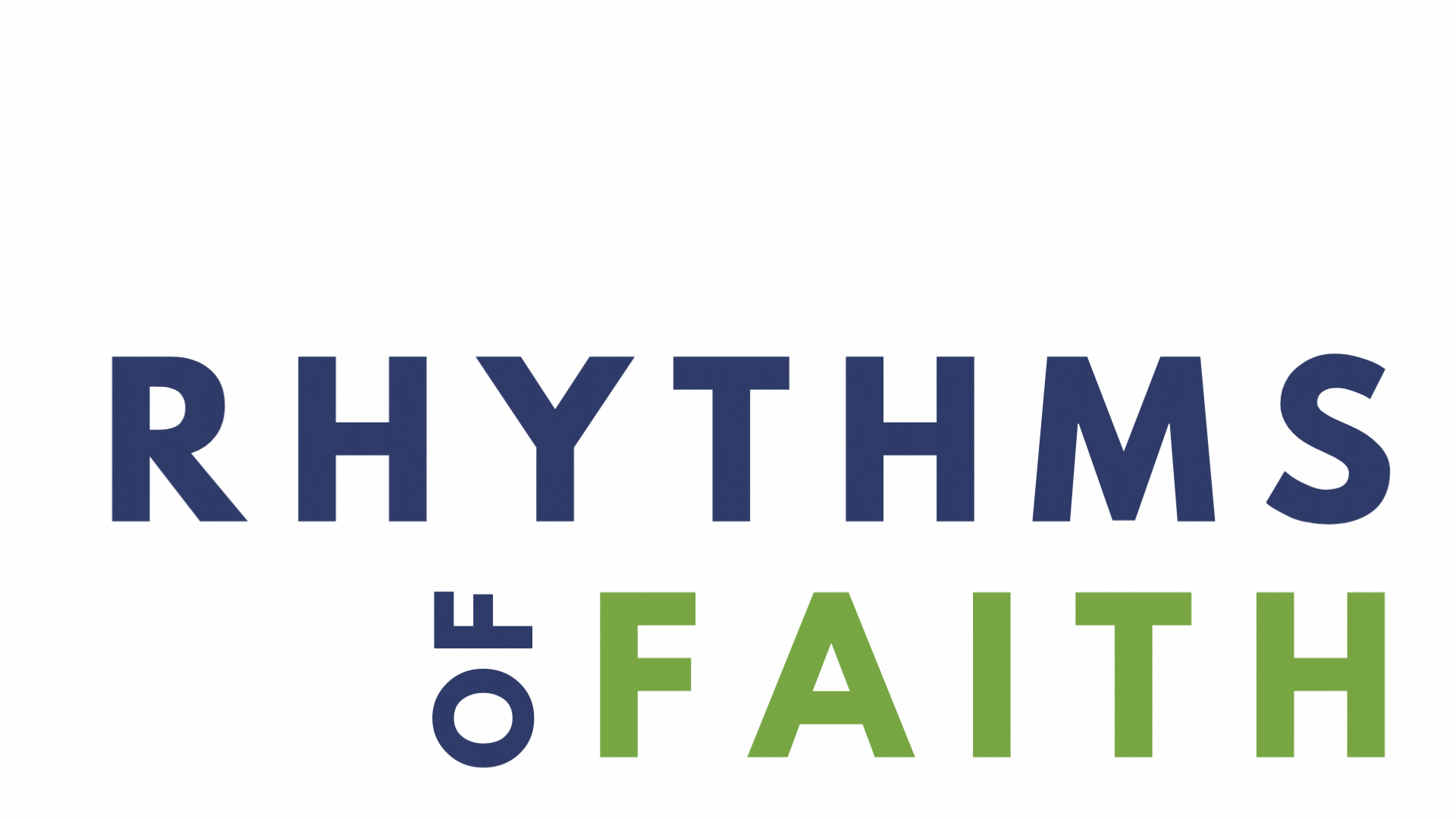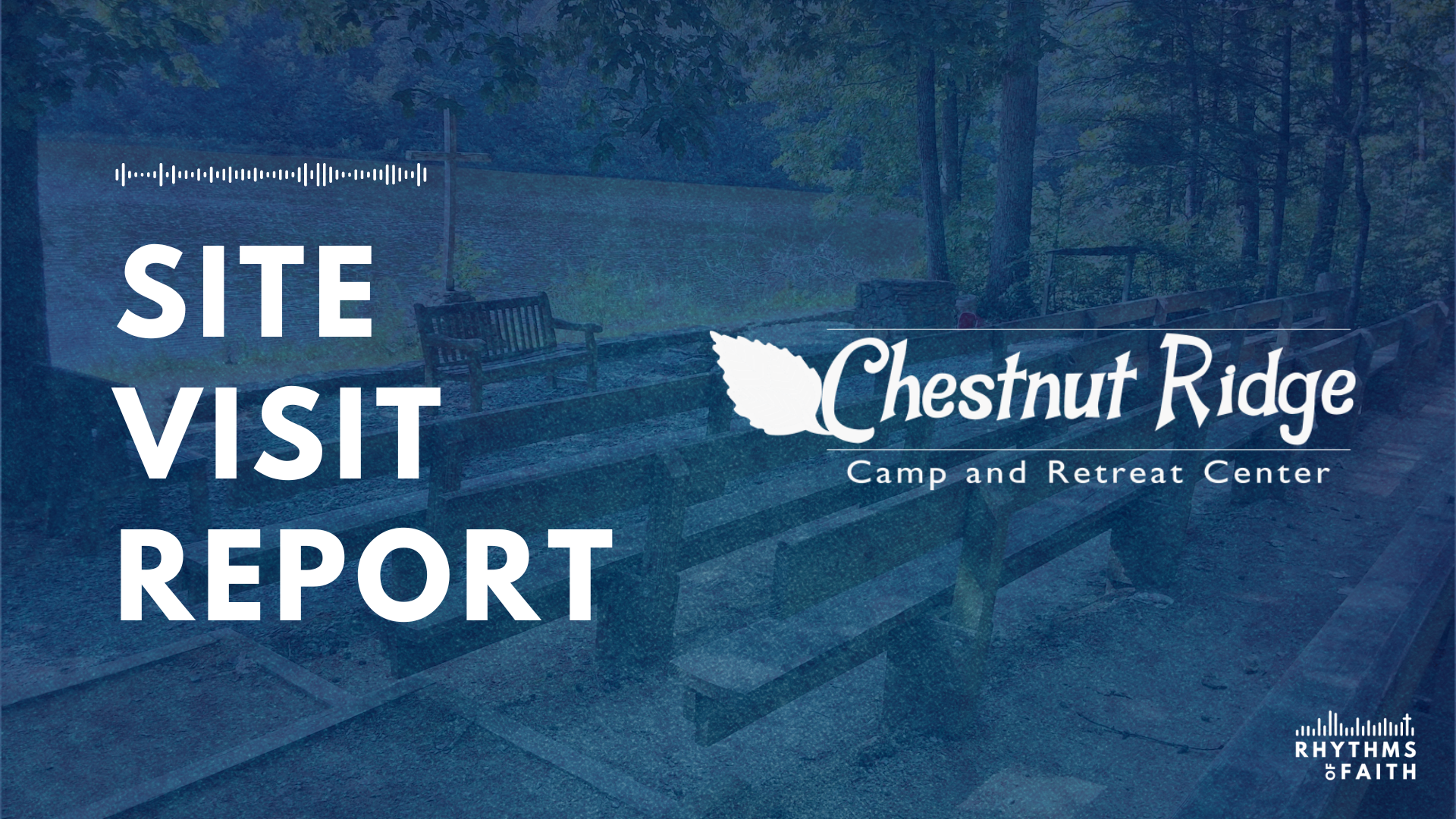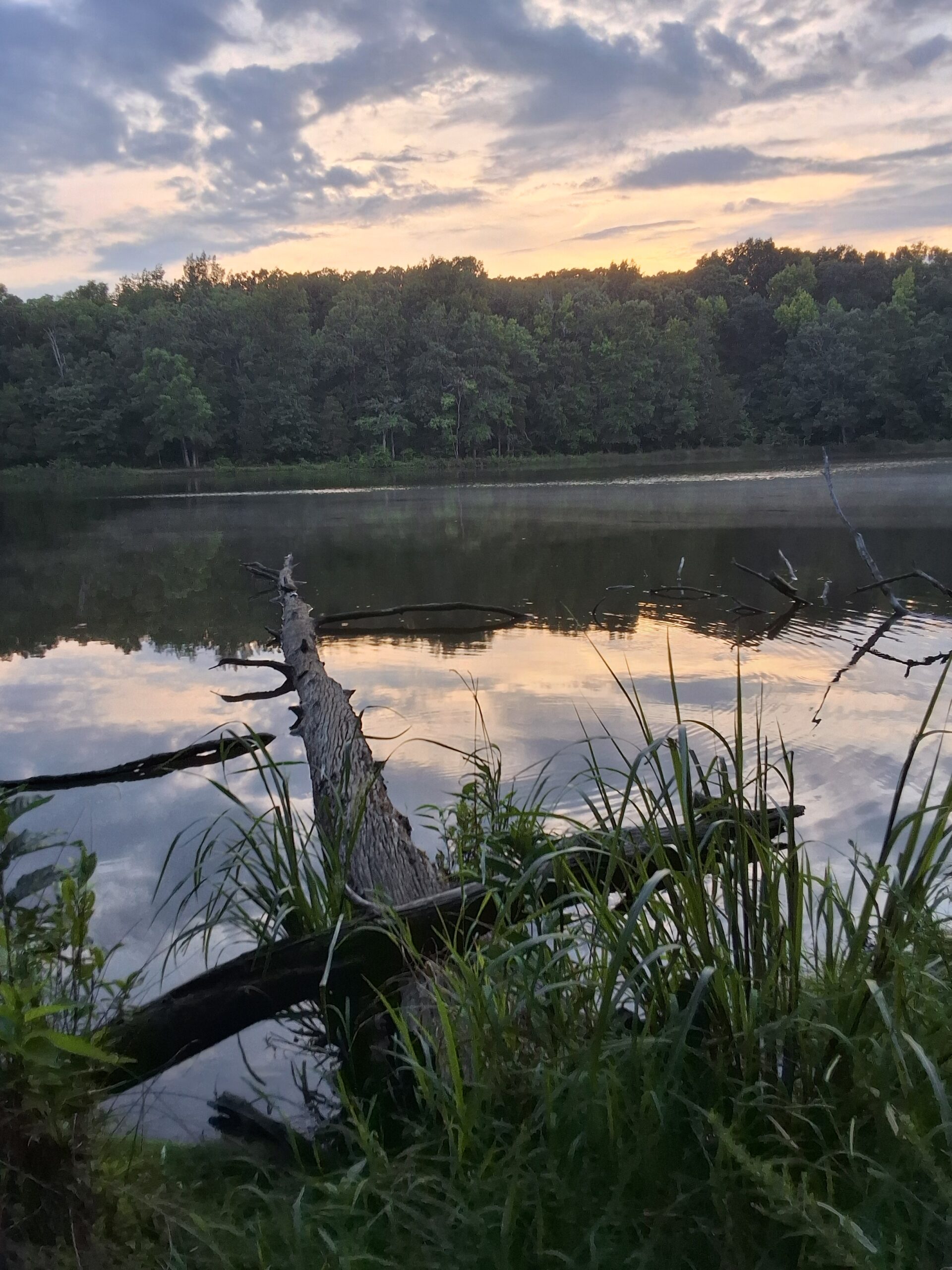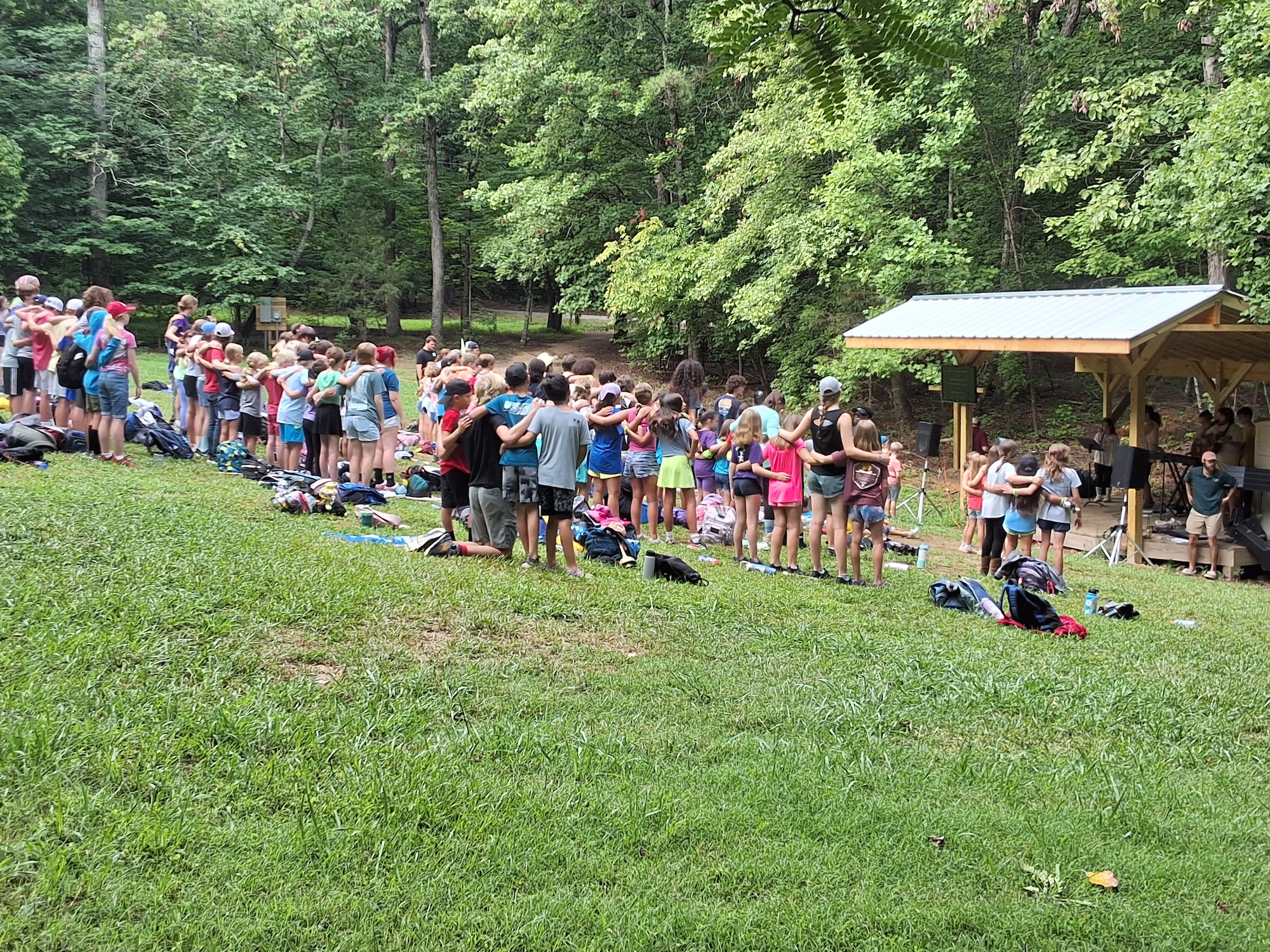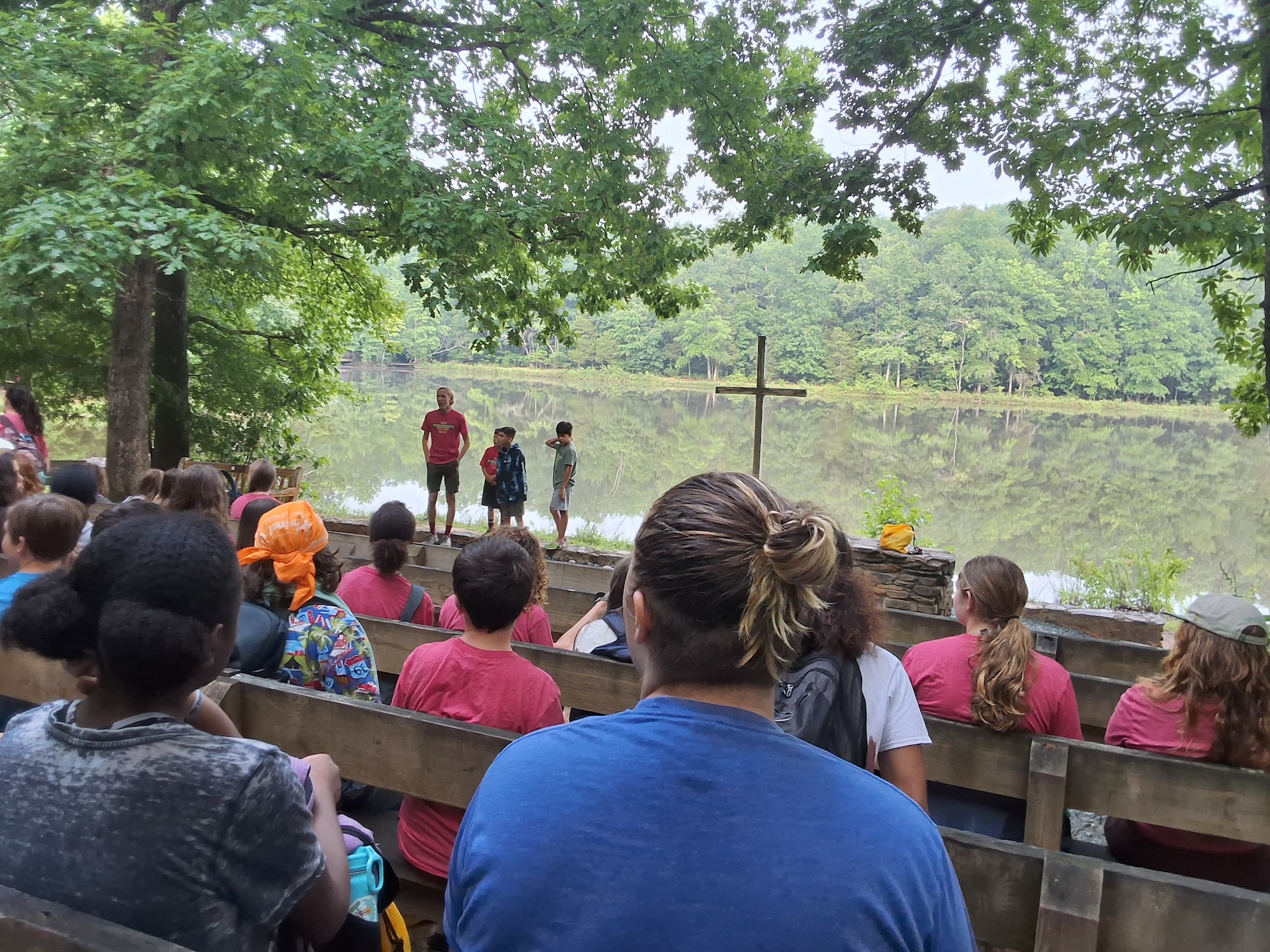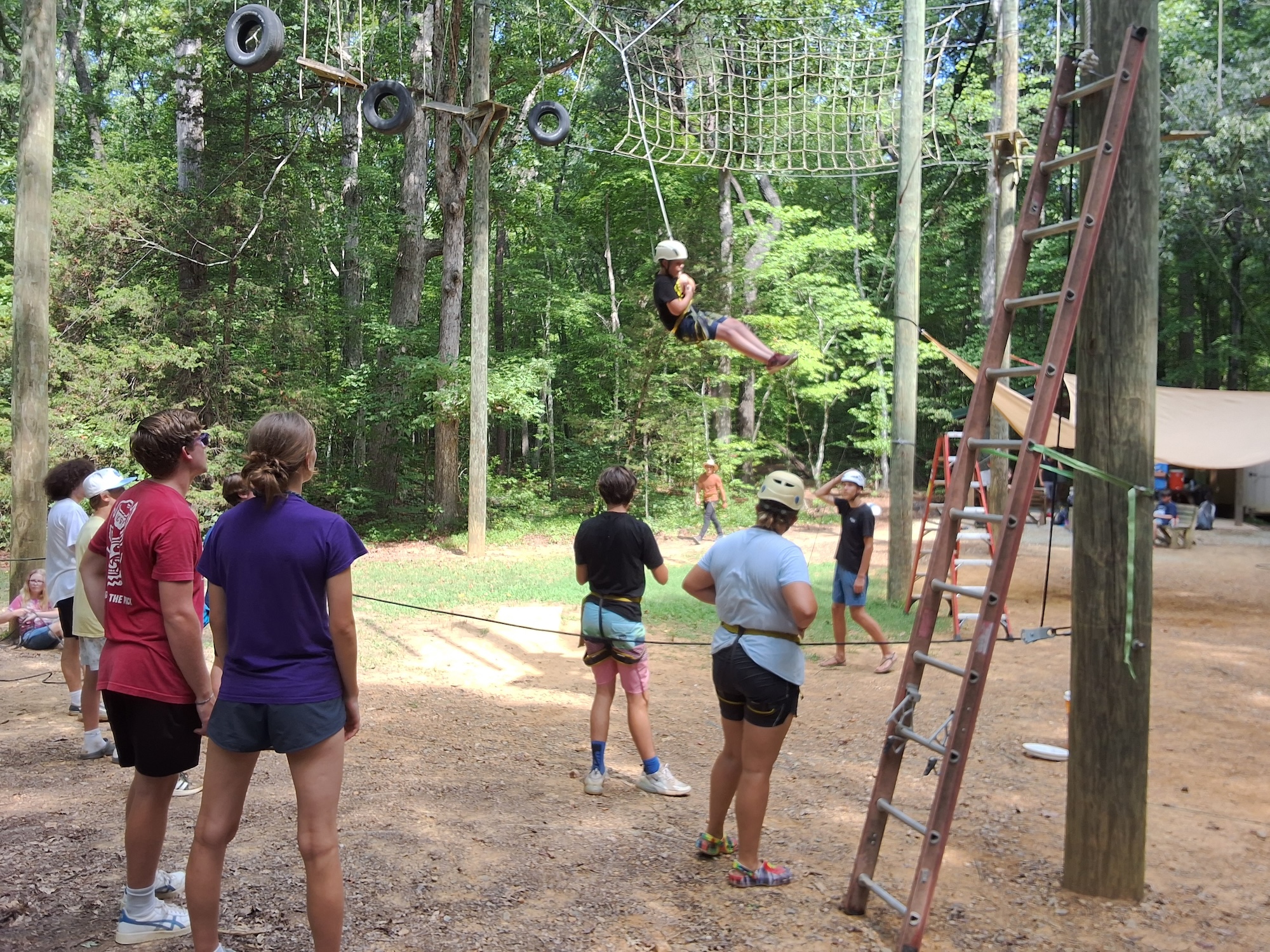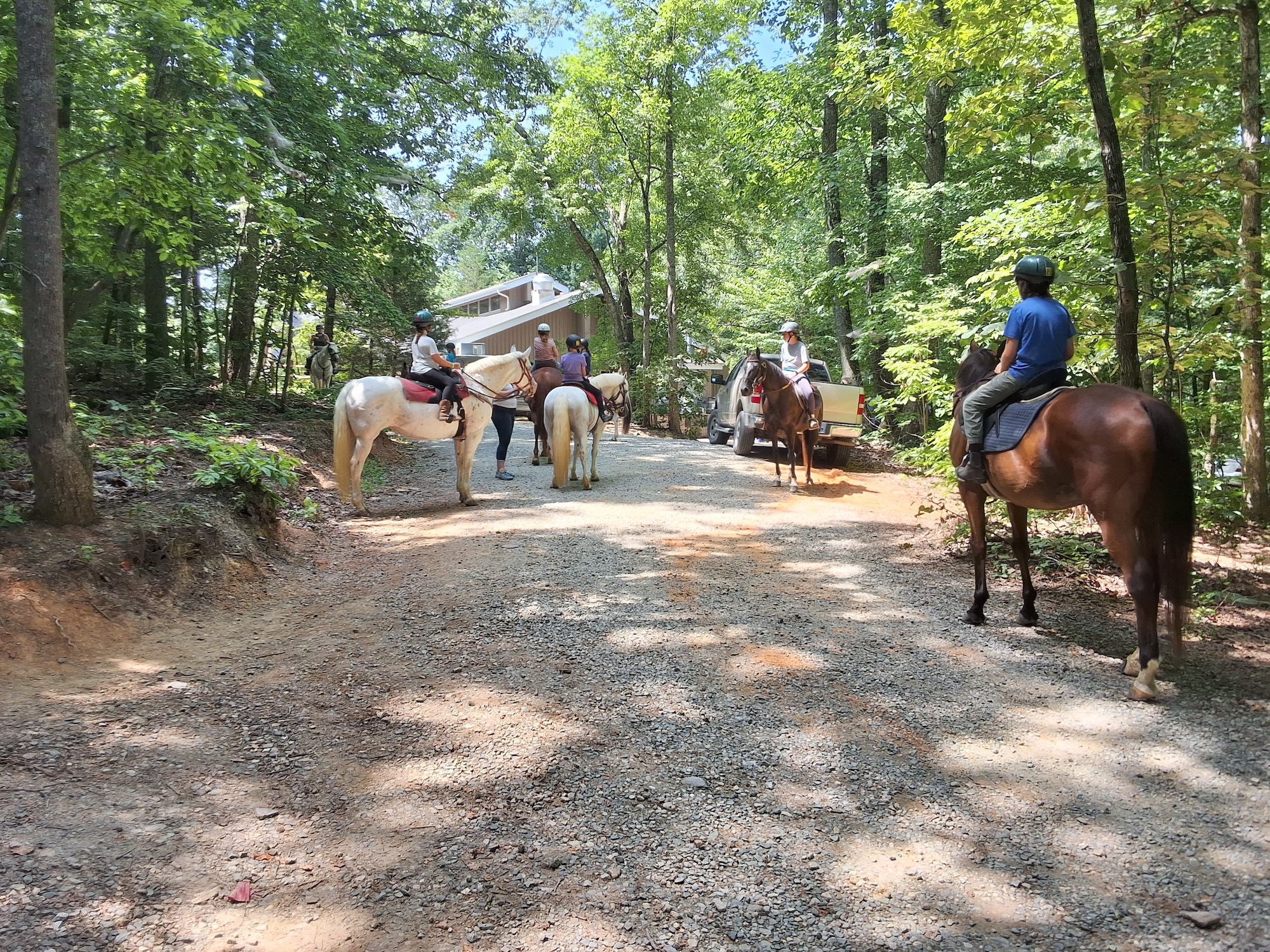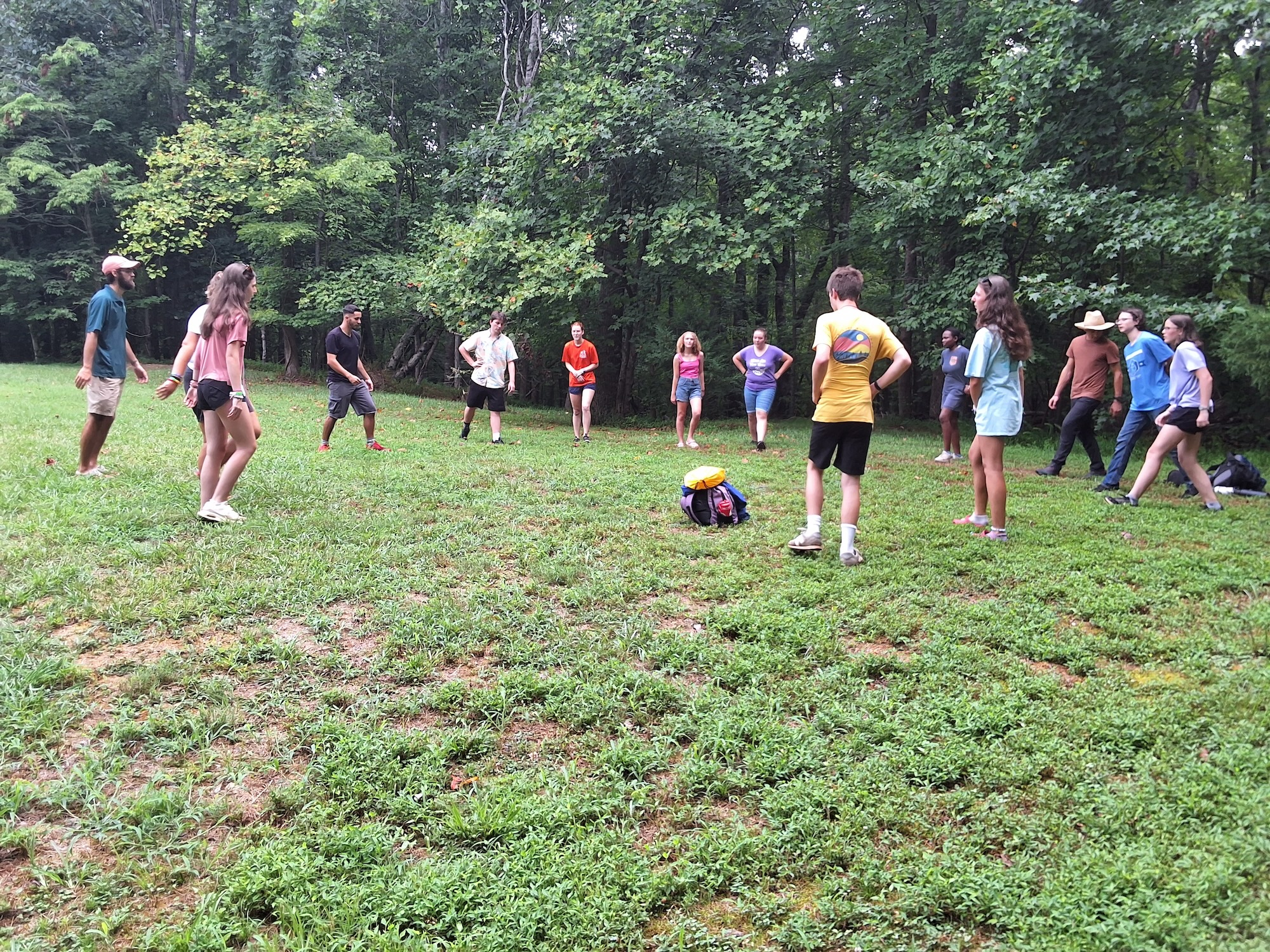A Tour of Chestnut Ridge
I traveled to Chestnut Ridge as part of the Rhythms of Faith Project, which is investigating camp’s role as a catalyst for family faith formation. Chestnut Ridge was founded in 1959 and is located 20 minutes from Chapel Hill and 30 minutes from Durham, NC. The road into Chestnut Ridge is a gravel road that leads you into the 362-acre grounds covered in rolling hills and large mature trees of a North Carolina forest. As you turn down Camp Chestnut Ridge Road, you first pass a United Methodist Church, which provides a visual reminder that Chestnut Ridge is a United Methodist Camp. Over the past few years, United Methodist camps like Chestnut Ridge have felt heavily impacted by changes brought by COVID and the shifts in denominational splintering that have occurred.
Continuing down the gravel road, a sign welcomes you to Chestnut Ridge, along with signage to continue toward the heart of the grounds—The Morris Center, which is a central meeting space on the grounds. The Morris Center is a multipurpose building and encompasses the dining hall, kitchen, annex room, and office. This is the only large group communal building providing indoor air conditioning. The gravel roads and trails of Chestnut Ridge wind through the N.C. forest to the cabins and camp activity spaces located on the grounds. These spaces include the typical camp spaces—the lake with lake toys and kayaks, a Zipline, a ropes course, playfields, multi-use trails (covering 8 miles), disc golf course, archery field, pool, basketball court, and beach volleyball courts. In addition, Chestnut Ridge also has equestrian facilities, a community farm, an outdoor preschool, and a pastoral cottage. For communal worship, the camp has two open-air spaces: the Lake Chapel, an open-air theater with a beautiful view of the lake, and the Forest Chapel, a hill surrounded by a cathedral of large trees. Other spaces include the prayer labyrinth and stations of the cross trail.
Mission and Offerings
The mission of Chestnut Ridge is to make the love of Christ visible through the practices of hospitality, responsible care for the earth, and meaningful fellowship that strengthens the community. Their mission guides their programming for overnight summer camp and their offerings throughout the year to meet the needs of their surrounding community.
Chestnut Ridge offers a wide variety of programs that serve over 11,000 individuals per year, from preschool to senior adult. These programs include summer overnight camp, summer day camp, retreats, after-school, horseback riding, community farm, outdoor education field trips, team building, birthday parties, Traveling Day Camp, a half-day outdoor preschool, and family faith formation. They are prepared to be hospitable and meet people where they are in life and on their spiritual journey.
While this narrative focuses on the overnight camp experience, it is important to note the many other faith formation programs offered by Chestnut Ridge, which partners with surrounding families, schools, churches, and broader communities. For some individuals, Chestnut Ridge may be part of their life just for a reason; for others, it is a season, and for some it is a lifetime. This idea was best portrayed during my conversation with the older campers. For some campers, it was their first time going to camp, while for others, it was their tenth year at the camp (their parent had also attended the camp), and they hoped to come back as counselors the following year. Other campers regularly participated in the after-school programs, day camps, and overnight camps that Chestnut Ridge offered. For these campers, Chestnut Ridge was more of a third place—i.e., places where you can relax in public, encounter familiar faces, and make new acquaintances.
A Closer Look at Summer Camp
The context of summer camp includes both day camps (~95 per week) and overnight camps (~70 per week). During the day, campers may range from preschool through high school. For overnight camps, students will be dropped off on Sunday afternoon and picked up on Friday after 5 pm. These different types of camps provide Chestnut Ridge with opportunities for spiritual formation and developmentally appropriate opportunities for campers to explore different skills and interests. For example, they offer a variety of distinct overnight summer camp options. Overnight camp options include:
Best of Camp: Campers experience the popular camp activities- lake toys, zipline, hayride to the farm, gaga ball, archery, and so much more!
Horseback Riding: Campers learn about tacking up, grooming, and horsemanship as they develop skills in a centered riding style. Campers may ride in the arena and on trails.
Herpetology: Campers are engaged in hands-on ecological fieldwork and exploring the hardwood forest around Chestnut Ridge. Campers collect, process, and learn about the salamanders, frogs, snakes, turtles, and lizards at camp.
Wilderness Adventure: Campers go on a unique overnight adventure and participate in whitewater rafting, rock climbing, caving, and hiking.
Leaders-in-Training: Campers enjoy the best of camp and focus on leadership development, growing in their faith, service, and team building.
Philosophical priorities are observable in programming.
As noted earlier, the mission of Chestnut Ridge is to make the love of Christ visible through the practices of hospitality, responsible care for the earth, and meaningful fellowship that strengthens the community. As I explored the camp, I noticed that these values were embodied in their programming. For example, hospitality was demonstrated in their inclusivity and noted explicitly by students who felt like camp was a place where they could be accepted for themselves. Another example of philosophical priorities could be seen after meals, where the leftover food was collected at the trash cans and fed to the pigs on the farm to demonstrate responsible care for earth. In addition to these values, which uniquely shaped the culture of Chestnut Ridge, the camp also demonstrated other key aspects of quality Christian camps: the centrality of faith, relationality, participatory learning, unplugging from technology, and immersion in outdoor spaces.
Centrality and Integration of Faith
The camp schedule was structured intentionally so that campers would experience multiple daily opportunities to practice and integrate the Christian faith. Many counselors noted that Chestnut Ridge embodies a spirit of “challenge by choice” and inclusivity in all activities, including faith activities. Christians and openly identifying non-Christians participated in faith activities together. Christian campers noted gratitude for opportunities to learn that their faith can be fun, and non-Christians enjoyed the songs, encouraging messages, and opportunities to pause and reflect during their day. Overall, camp faith activities shared simple and fundamental truths while allowing campers to explore their faith beliefs without pressuring them. Each day, campers participated in faith-filled liturgy of:
Morning Prayer
Before breakfast, students begin their day with morning prayer at the Lake Chapel, which is led by campers. One camper may read a verse, another may reflect on what the verse means, and the last camper will read a blessing. Then, all campers will sing one of their beloved mealtime prayers.
Morning Worship
Campers head to the Forest Chapel after breakfast and participate in morning worship. The order of worship is a silly song, a call to worship, a few fun upbeat worship songs, a slower swaying song, a skit, a chaplain-led message, one more song, a benediction, and then morning announcements.
Lunch Prayer
Campers will sing one of the beloved mealtime prayers before heading towards the family-style lunch. Several posters hung around the dining hall have the words to various prayers. Each prayer is sung to a different theme. Campers’ favorites included the Addams Family, Johnny Appleseed, and Star Wars.
Small Group Discussion
The chaplains provide camp counselors with a facilitator guide to help them delve deeper into the morning worship (skit and discussion).
Dinner Prayer
Campers will once again sing one of the beloved mealtime prayers before eating a family-style meal.
Vespers
After evening activities, the campers will meet at the Lake Chapel, and a chaplain or visiting pastor will lead students through a faith reflection, prayer, and blessing.
During the week, there were a few additional experiences where faith was integrated into the schedule:
Faith Formation
Towards the end of the week, chaplains will meet with each group once to provide a time for deeper reflection on faith.
Lake Walk
On Thursday evening, students will enter a period of reflection and walk along the lake to different stations. At these stations, campers will be asked to reflect on important passages and stories that align with the theme. After campers have made it through all the stations, students will gather at Lake Chapel and collectively participate in a time of worship, and the chaplain will provide a simple message.
Closing Ceremony
The closing ceremony is the last activity on Friday before campers leave. During the ceremony, campers will have the opportunity to reflect on their week by singing songs and conducting skits. They will also be prompted to reflect on new experiences, new friends, new things learned, and whether they learned anything new in their faith.
Camp as a Temporary Experience
While Chestnut Ridge does view camp as a temporary experience within a larger ecology of faith formation, they are challenged with constantly grappling with the reality of programs offered throughout the year (retreats, afterschool) where they may also see these same students and families. So, for some campers, Chestnut Ridge is a primary part of their family’s support system in the area and, therefore, an important part of the larger ecology of faith formation. For example, one overnight camper attended their afterschool program and could have been a part of their family ministry, Seeds of Faith. Additionally, simultaneously offering day camp and overnight camp can be challenging in providing two distinct experiences of temporary community to overnight campers and ongoing caring relationships with day campers.
Leadership Training
Chestnut Ridge does have a distinct legacy of creating a culture of leadership development and lifelong discipleship in their camps. Many camp counselors had been involved with the camp for 10 to 14 years of their life. This cultivation of leaders is explicitly seen in their L.I.T. (leaders in training) overnight camp. Rising juniors can participate in the two-week overnight camp; during camp, they will be trained as lifeguards, CPR certified, shadow camp counselors, learn leadership skills, plan and enact service projects, and go on a backpacking trip. Many of the LIT campers will apply to be counselors the next year. Many continue to come back and work throughout college. Campers noted that the leadership experience transfers to more confidence back home.
Family Engagement During Camp
Chestnut Ridge has several touchpoints with parents and other adults in the campers’ lives. First, families are able to access information online to facilitate preparing for camp. Parents will then participate in camper drop-off on Sunday night. This begins with a parent information session. Then, parents and campers carry their luggage to the cabin with the assistance of staff. During camp, parents will have access to multiple online resources, including sending mail to their campers and viewing photos of their campers (see figure below). Parents will pick up campers on Friday after 5 pm. At pickup, parents will receive a one-page flyer that provides an overview of what happened at camp that week and an advertisement for participating in the family program called Seeds of Faith, which provides a weekly dinner for families while empowering families with family faith formation.
Practice Adaptive Leadership
Like many camps in our sample, Chestnut Ridge exhibited deep curiosity, a desire to learn, and the necessity to be adaptive. Camp leaders described things like COVID-19, denominational fracturing, declining church attendance, and shifting cultural values as putting pressure on them and their organizations. How they responded to these challenges set some apart regarding their adaptive leadership. During camp, camp counselors and chaplains noted that the leaders provide opportunities for feedback. The staff noted that camp leadership seemed very willing to listen to their suggestions and make feasible changes.
Broadening my Ideas of Christian Camp & Campers
As I begin these final remarks, it is worth noting that I have attended overnight camps for 12 summers– 7 years as a camper, 4 years as summer staff/counselor, and 1 year as a parent-counselor. My camp experience is with six different Christian camps and three non-Christian camps. Therefore, I expect that every camp looks a little different. So, I was a bit surprised that when reflecting on my time at Chestnut Ridge, I most appreciated how this site visit challenged and broadened my narrow understanding and personal experience of Christian camps.
Specifically, there were four observations that contributed to broadening my concept of the Christian camp. First, Chestnut Ridge served children of all ages. They journeyed alongside many of these children for multiple ages and stages of life—for some through adulthood. Second, they provided a diverse range of developmental experiences beyond traditional camp fun activities and faith formation. Third, the camp continued their support beyond the summer, also supporting families with options for afterschool care and family programs. And finally, I most appreciated seeing a Christian camp embody their faith and be hospitable and inclusive to those with alternative beliefs.
As our team has been doing this research, we have noticed several other camps that are providing year-round ministry and support to campers and their families. We also noticed an uptick among the unchurched and non-religious attending Christian camps. As we continue to advance our research on impacting family faith practices, it will be interesting to dig deeper into different models of Christian camps as well as the assumptions we may have about campers’ spiritual backgrounds.
Family Engagement: Family-Centered vs Family-Inclusive
Also, I share that I am an associate professor in Child & Family Studies at a Christian university. I teach and conduct research on adolescents, out-of-school time settings, and family time. In my previous scholarly works, I have written about how positive youth development programs like camps must be intentional about their family engagement. There are two main approaches to family engagement. The first is creating family-centered programs. In camp programming, a family-centered approach looks like a family camp, where the family is an active participant in the program. Our team has noted that many camps are utilizing a family-centered approach to impact family faith practices.
The second family engagement approach is creating family-inclusive programming. Family-inclusive programming is a more feasible option for traditional adolescent overnight camps. In this approach, providers consider how they can proactively support families in 5 areas: family engagement, family responsibilities, family stability, family relationships, and family diversity. From this lens, I was most delighted with my site visit, as Chestnut Ridge is intentionally mindful of supporting the community they serve and the families within that community.
As our research team moves forward in this research project on the traditional overnight Christian camps and their impact on family faith practices, I hope that family-inclusive programming becomes part of the conversation on how camps can intentionally support the family.
